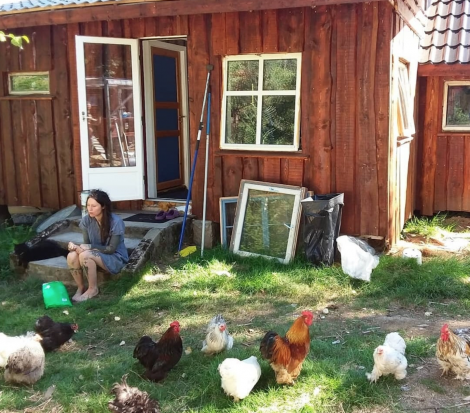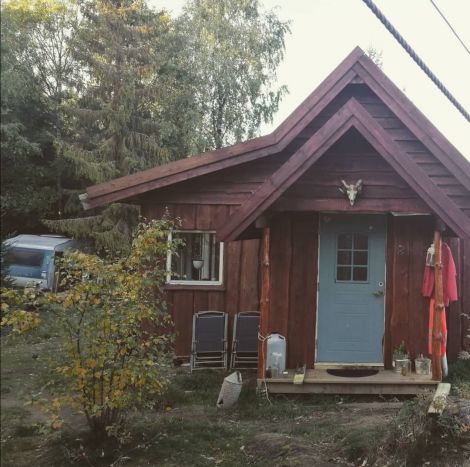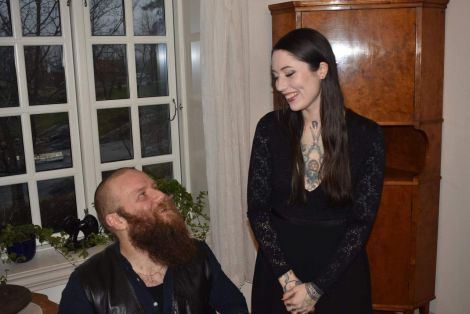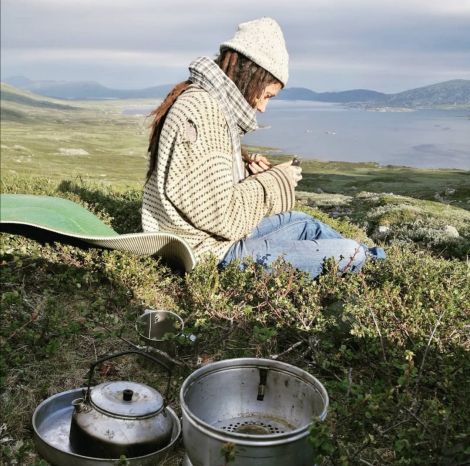Features / ‘Life slows down’: the islander who swapped Shetland for living off-grid in a Norway forest
IN THE winter, Letty’s day will usually begin by getting up with her child, at some time between 5am and 7am, before she lights the fire as fast as she can for some extra warmth.
“Then I go out, let the chickens out and give the animals water because it’s usually frozen by morning.”
It is chilly in Norway in the winter, but especially chilly when you are living ‘off grid’ in a wood cabin in the forest, in a village about an hour away from Oslo.
It is where Letty Eriksen has called home since moving eastwards to Norway from Shetland a few years ago, in a snap decision she has not looked back from.
That’s even if there is no electricity or central heating, no hot water on demand, and she has to let loose into a bucket which forms part of a compost toilet.
Water, meanwhile, is sourced from nearly 100 metres underground, using a pump rather than being piped indoors like the rest of us.
The premise behind living off grid is fairly simple – it is intrinsically independent, and a way of cutting yourself off from the connections most of the modern world rely on, such as mains electricity.
It is how Letty has been living since she moved to Nesodden a few years ago.
Not only did she pick up a new lifestyle, but she picked up a husband too – with a baby also later arriving last year.
Her partner Leif-Christian Eriksen was already living off-grid, and Letty was welcomed into the lifestyle with open arms.
“It’s a way of living which means you are totally independent from public utilities like mains power or water,” she explains.
“The only bills we pay is the council tax to cover our rubbish collection and we have an unlimited data plan instead of WiFi.”
Become a supporter of Shetland News
Letty picks out indoor plumbing, and running hot water, as two dream home improvements. “We have to go out to the water pump and carry in buckets of water to use in the house, and heat any water we need on the stove.
“I only wash our dishes with cold water. I would love a fridge and freezer because we have a little cellar where we keep food but in summer things go mouldy very quickly and in winter things freeze solid and get ruined down there.
“But we are getting solar panels this year so I will be finally getting my wish of a fridge.”
Keeping clean isn’t without its difficulties too. “We have a big bathtub in the middle of the living room which we use for sitting in while we pour water on ourselves to wash,” Letty says.
“We fill up the bathtub for a proper bath maybe once a month because it is such a palaver.
“We have a 150 litre pot and a 60 litre pot that we have to fill up and boil on the wood stove which takes hours.”
Letty, formerly Bishop by last name, grew up in Shetland before an arts opportunity in 2017 presented her with the chance to travel to Norway.
With a degree in fashion, the 29-year-old decided to head to Norway to undertake research for the project, but she had no idea she would ultimately settle down in the Scandinavian country.
“I knew that I would also be giving up my old life of comfort and convenience, but it was a lifestyle that I had always admired and been interested in before,” she says.
Letty, a self-employed seamstress, is used to living off-grid now, but there are some compromises to be had – especially with a child in the family.
At the moment the house has four AGM batteries charged by a diesel generator, “which isn’t ideal”.
“But we are investing in solar panels this year which will mean we will have enough power for everything I want,” Letty adds.
“I think if it was up to my husband he would be happy with no power at all but now we have a baby I definitely need a little bit of modern comforts.
“As for our water, we survived a couple of years by filling up water jugs wherever we could, but we saved up to get a well drilled in our garden and a pump fitted.
“Our toilets are compost toilets, which means we collect our poop and turn it into compost.”
Much of the Eriksens’ food is brought in, though, with Letty still figuring out the best way to grow her own.
“We do have a s**t ton of honey we harvested in summer that would probably last us years,” she adds.
“I am planning on growing a lot of pumpkins this year because they store well. I am improving each year and my goal is to grow and preserve more of our food.”
The Eriksens are joined at their homestead by a chicken rescued from a factory, two cockerels who are father and son, two rescue rabbits called Hank and Maggie and a cat called Goblin – while they have some bee hives too.
“We used to have two pet pigs but they became too much for us when they learned how to escape and would often rampage around our neighbours’ gardens and destroy things,” Letty says, “and we didn’t have electricity for an electric fence, so they went to a petting zoo in Sweden.
“In the future I want to get ducks to help eat slugs.”
In April last year two Eriksens became three, with a child – named Fox – added to the family.
Living off grid has its obvious difficulties when a baby is added to the mix, but Letty says things are manageable, and improvements always on the agenda.
“It is very challenging having a baby in these conditions but we already knew how hard it was going to be so we have every single function of living down to a fine art,” Letty says.
“We are also constantly upgrading things and figuring out better ways of doing things and investing in solutions.”
Letty is speaking in January, when temperatures in Nesodden are liable to reach as low as minus 10 and snow can be present from December to March, or longer.
“My first winter was pretty depressing,” she admits.
“I didn’t know anyone here yet and I hadn’t mastered the art of keeping happy and cozy and cheerful to survive the long winter.
“Norwegians actually look forwards to winter because they love skiing so much. I try to take inspiration from their love of winter.”
Their wood cabin, or ‘hytte’ in Norwegian, is located in the forest, within a small community of about 10 houses.
The nearest shop isn’t too far away – a five minute drive or a 30 minute walk – while getting to Oslo includes taking a ferry.
Letty was born in raised in Shetland, moving to Aberdeen when she was 17 to study fashion design at university.
Following internships at Gieves & Hawkes tailors in London and at designer Iris Van Herpen in Amsterdam, Letty returned to Shetland when she was in her mid twenties.
It is clear living off grid isn’t without its challenges, but what is life without a challenge?
While she is living a life less connected to electricity, water and broadband, it appears Letty is reaping a more important reward – being more connected to herself.
“I don’t know if it’s thanks to living off grid or more meeting my husband, but whichever it was I have really gotten things together since I came here,” she says.
“Having such a secure home and family has cured my anxiety.
“My appearance was always very important to me before but now it is not important. My priorities have changed drastically.
“I had to go to school to learn Norwegian which was very humbling. I was 27 years old with a degree and was back in a classroom learning how to say cat and dog.
“Life slows down. I’m no longer working my ass off just to pay rent and barely scraping by. Although I have to s**t in a bucket, it is worth it to be free.”
Become a supporter of Shetland News
Shetland News is asking its many readers to consider start paying for their dose of the latest local news delivered straight to their PC, tablet or mobile phone.
Journalism comes at a price and because that price is not being paid in today’s rapidly changing media world, most publishers - national and local - struggle financially despite very healthy audience figures.
Most online publishers have started charging for access to their websites, others have chosen a different route. Shetland News currently has over 600 supporters who are all making small voluntary financial contributions. All funds go towards covering our cost and improving the service further.
Your contribution will ensure Shetland News can: -
- Bring you the headlines as they happen;
- Stay editorially independent;
- Give a voice to the community;
- Grow site traffic further;
- Research and publish more in-depth news, including more Shetland Lives features.
If you appreciate what we do and feel strongly about impartial local journalism, then please become a supporter of Shetland News by either making a single payment or monthly subscription.
Support us from as little as £3 per month – it only takes a minute to sign up. Thank you.































































